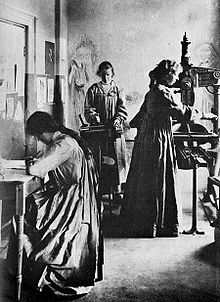
Back ছোট প্রেস Bengali/Bangla Mikroforlag Danish Independent-Verlag German ناشر خردهپا Persian Édition indépendante French Penerbit independen ID Parvum prelum Latin Small press Dutch Editora independente Portuguese
This article needs additional citations for verification. (April 2019) |

A small press is a publisher with annual sales below a certain level or below a certain number of titles published. The terms "indie publisher" and "independent press" and others are sometimes used interchangeably. However, when a distinction is drawn, there are about 100,000 small presses and about one million independent presses.[1]
Independent press is generally defined as publishers that are not part of large conglomerates or multinational corporations. Even when owned by a larger business, an independent press is allowed to choose which books to publish, and the business will survive or fail as a result of how well those books sell.[1] Many small presses rely on specialization in genre fiction, poetry, or limited-edition books or magazines, but there are also thousands that focus on niche non-fiction markets.
Other terms for small press, sometimes distinguished from each other and sometimes used interchangeably, are small publishers, independent publishers, or indie presses.[2]
Independent publishers (as defined above) made up about half of the market share of the book publishing industry in the United States in 2007.[3] The majority of small presses are independent or indie publishers, meaning that they are separate from the handful of major publishing house conglomerates, such as Random House or Hachette.[4]
- ^ a b Biel, Joe (2018-12-05). People's Guide to Publishing: Building a Successful, Sustainable, Meaningful Book Business From the Ground Up. Microcosm Publishing. pp. 21–22. ISBN 978-1-62106-313-1.
- ^ "Complete Guide to Small Press Publishing: The Good, The Bad, and The Ugly of Small Presses for Writers". TCK publishing. 9 November 2017. Retrieved 18 April 2019.
- ^ Herman, Jeff Herman's Guide To Book Publishers, Editors & Literary Agents, 2007, p. 131.
- ^ "Independent Book Publishers Statistics – WordsRated". 2023-01-19. Retrieved 2024-01-22.